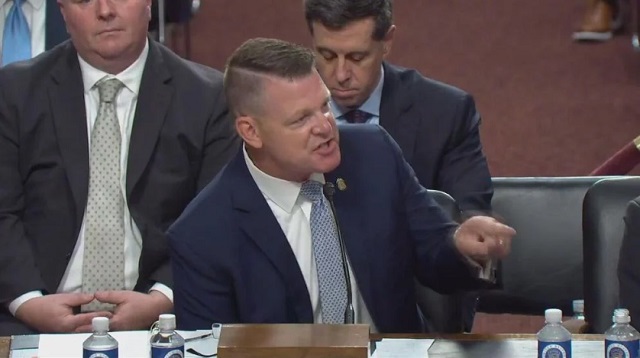International
Failures of Secret Service mount as senators demand accountability

From The Center Square
By
The failures of the Secret Service around the attempted assassination of former President Donald Trump are mounting but members of Congress say there’s not been enough accountability.
Trump suffered a wound to the ear, a spectator was killed and two others were critically wounded when a sniper opened fire in Butler, Pennsylvania, at a campaign rally on July 13. Former Secret Service Director Kimberly Cheatle resigned last week after a U.S. House hearing failed to get answers.
On Tuesday in a U.S. Senate hearing, Secret Service Acting Director Ronald Rowe told U.S. Sen. Josh Hawley, R-Missouri, those on the ground making decisions that day have not been fired.
“Is it not prima facie somebody has failed? A former president was shot,” Hawley said.
“Sir, this could have been our Texas Schoolbook Depository,” Rowe said, referencing the sniper’s outpost in the 1963 assassination of President John Kennedy in Dallas, Texas. “I have lost sleep over that for the last 17 days, just like you have.”
“Then fire somebody, to hold them accountable,” Hawley said.
U.S. Sen. Josh Hawley, R-Missouri, Acting U.S. Secret Service Director Ronald Rowe, and U.S. Sens. James Lankford, R-Oklahoma and Dick Durbin, D-Illinois, during Tuesday’s joint hearing on the attempted assassination of former President Donald Trump.
Hawley was asking why the people who made the decision to not have someone on the roof where the sniper was ultimately killed, who managed radio communications or who failed to keep the president from taking the stage that day have not been fired.
Tuesday’s joint hearing was with the U.S. Senate Judiciary and Homeland Security committees. Senators reviewed the lapses in communications, placement of the parameter in Butler and where the buck stops for the failures.
Discussed was how the shooter was known minutes before the shooting to be suspicious with a rangefinder before being seen with a gun. The shooter even sent up a drone hours before the event. Rowe said they didn’t have their anti-drone systems in place until later in the day.
“It appears that there was an offer by a state or local agency to fly a drone on our behalf and I’m getting to the bottom of why we turned that down,” Rowe said.
The motive of the shooter, who was shot and killed, is still being investigated.
U.S. Sen. Dick Durbin, D-Illinois, confirmed from the Secret Service and the FBI that they are updating their security posture after the lessons of July 13 ahead of next month’s Democratic National Convention in Chicago.
“Tens of thousands of people will be there including some of the highest ranking politicians in the United States,” Durbin said.
2025 Federal Election
Corporate Media Isn’t Reporting on Foreign Interference—It’s Covering for It


 Dan Knight
Dan Knight
A CCP-linked propaganda campaign boosted Mark Carney, but instead of sounding the alarm, the CBC cast him as the victim. The truth? He wasn’t targeted—he was the beneficiary.
So let’s stop pretending. The headlines, the bureaucratic spin, the carefully worded talking points—none of it changes what actually happened. This week the Canadian government just confirmed what they’ve been denying for years: the Chinese Communist Party is interfering in our elections. Not in theory. Not in the abstract. Right now. In real time.
And who’s the beneficiary? It’s not the opposition. It’s not the people calling out foreign interference. It’s not the Conservative candidates getting smeared, doxxed, or targeted by digital hit jobs. No, the beneficiary is the man now leading the Liberal Party. The man who was handpicked to replace Trudeau and keep the globalist machine running smoothly. That man is Mark Carney.
According to the SITE Task Force—the very same group tasked with monitoring foreign interference—a CCP-linked WeChat account ran coordinated messaging in Chinese-language communities across Canada. That messaging didn’t attack Carney. It elevated him. It portrayed him as a strong, capable leader, someone who would stand up to the United States. That’s not an attack. That’s not foreign meddling meant to sow chaos. That’s targeted influence designed to shape an outcome. To tip the scale.
So what did the press do with this information? CBC, CTV, the Globe and Mail—they all ran with the same disingenuous line: “Chinese information operation focused on Carney.” Focused? That’s the best they could do? He wasn’t the focus. He was the favorite. He wasn’t the target. He was the chosen candidate. The state broadcaster, which receives $1.2 billion a year in taxpayer funds, chose to frame a CCP influence operation that benefited Carney as if he were the victim. And they wonder why trust in media is collapsing.
Meanwhile, who was actually targeted? Joe Tay. A Conservative candidate. A Canadian citizen. And someone with the courage to speak out against Beijing’s repression. For that, the Hong Kong government—acting on orders from the CCP—put a bounty on his head. HK$1 million for his arrest. And then, in an absolutely disgraceful moment, Liberal MP Paul Chiang repeated that bounty in public, in Canada, saying someone could take Tay to the Chinese consulate and claim the reward.
What was Carney’s response? He called it a “lapse in judgment.” A “teachable moment.” Chiang remained a candidate until the scandal became too big to ignore and the resignation came—conveniently timed just before midnight. And not once—not once—did Carney publicly condemn the CCP. Not once did he say the name of the regime running operations to influence Canadian politics. Not once did he call out the foreign government targeting his opponents and helping him.
Why would he? He doesn’t want the interference to stop. He and the Liberals have benefited from it before—just ask Han Dong in Don Valley North—and they’re benefiting from it now. This isn’t hesitation. It’s a pattern. A Liberal MP parrots a CCP bounty and they defend him. A CCP media operation boosts their leader and they stay quiet. CSIS warns them about Beijing’s interference and they bury it. Every time, they play dumb. Every time, it’s the same excuse: no impact, no problem, nothing to see here.
But Canadians are not blind. They can see what’s happening. They can see who benefits. And they’re starting to realize that this isn’t about safeguarding democracy. It’s about safeguarding a narrative. Because when your elections are being massaged by foreign powers, and your media is too compromised to call it out, the system doesn’t just have a problem. It has a crisis.
And if we don’t deal with it now—if we let Beijing call the shots and let the CBC clean up the mess—then we’re not a democracy anymore. We’re a client state. And the country we thought we had will be gone. Quietly. Carefully. And permanently.
2025 Federal Election
Communist China helped boost Mark Carney’s image on social media, election watchdog reports

From LifeSiteNews
The goal, according to the Canadian government, appears to be ‘intended to influence Canadian-Chinese communities in Canada and … mold perceptions’ about the prime minister ahead of the April 28 federal election.
Canada’s Security and Intelligence Threats to Elections Task Force (SITE) confirmed that the Chinese Communist Party (CCP) government was behind an online “operation” on WeChat to paint Prime Minister Mark Carney in a positive light.
SITE noted that the CCP helped promote via a web bot “operation” a WeChat social media account that posted positive information about Carney, with the goal to help him win the 2025 federal election.
“The SITE Task Force assesses that the foreign, state-backed information operation was intended to influence Canadian Chinese communities and look to mold perceptions” regarding Carney, Privy Council Office assistant secretary for communications Laurie-Anne Kempton said at a press conference on Monday.
SITE said an “information operation on WeChat” took place by the Youli-Youmian WeChat account backed by the CCP.
WeChat is China’s main social media platform, and SITE said that “bot-like WeChat news accounts appear dedicated to amplifying content from the Youli-Youmian account.”
On March 10 and March 25, Youli-Youmian, who has the most popular news account on the WeChat platform, shared posts with followers that put Carney in a positive light to readers.
Both of the March posts quickly gained traction online with millions of views, catching the attention of SITE, which discovered the social media posts were part of an information war campaign by the CCP government.
“This content has been amplified in a coordinated and inauthentic way,” Kempton said.
“This information operation had contrasting positive and negative narratives, first amplifying Mr. Carney’s stance with the United States and then targeting his experience and credentials.”
The March 10 post from Youli-Youmian bore the title “The US encounters a ‘tough guy’ Prime Minister,” noting tariff negotiations with U.S. President Donald Trump.
As for the March 15 post, it was titled “Canada’s road to a ‘seeking survival’ election.”
SITE noted that the social media bot accounts reposting Youli-Youmian’s content “do not post original content” but instead “continue to repost Youli-Youmian content days after it was originally posted, likely to improve discoverability of the article, and boosting Youli-Youmian’s presence in user feeds.”
“Intelligence reporting links the Youli-Youmian account to the People’s Republic of China (PRC), the Chinese Communist Party’s Central Political and Legal Affairs Commission,” SITE noted.
According to SITE, the information war operation “intended to influence Canadian-Chinese communities in Canada (i.e. speakers of a Chinese language, such as Mandarin, Cantonese, or Hakka) and looked to mold perceptions” about Carney.
Canadians will be heading to the polls on April 28.
As reported by LifeSiteNews, a new exposé by investigative journalist Sam Cooper claims there is compelling evidence that Carney and former Prime Minister Justin Trudeau are strongly influenced by an “elite network” of foreign actors, including those with ties to China and the World Economic Forum.
LifeSiteNews recently reported that the Conservative Party sounded the alarm by sharing a 2016 video of Carney saying the Communist Chinese regime’s “perspective” on things is “one of its many strengths.”
LifeSiteNews reported last week that the Liberal Party under Carney has seen three MP candidates drop out of the election race over allegations of foreign interference.
The Foreign Interference Commission concluded that operatives from China may have had a hand in helping to elect a handful of MPs in both the 2019 and 2021 Canadian federal elections. It also determined that China was the primary foreign interference threat to Canada.
-

 2025 Federal Election2 days ago
2025 Federal Election2 days agoMark Carney Comes to B.C. and Delivers a Masterclass in Liberal Arrogance
-

 2025 Federal Election2 days ago
2025 Federal Election2 days agoPoilievre to invest in recovery, cut off federal funding for opioids and defund drug dens
-

 Podcasts2 days ago
Podcasts2 days agoThe world is changing – Trump’s Tariffs, the US, Canada, and the rest of the world
-

 Business2 days ago
Business2 days agoTrump threatens additional 50% tariffs on China, urges ‘patience’
-

 Alberta2 days ago
Alberta2 days agoProvince introducing “Patient-Focused Funding Model” to fund acute care in Alberta
-

 Alberta2 days ago
Alberta2 days agoMedical regulator stops short of revoking license of Alberta doctor skeptic of COVID vaccine
-

 International2 days ago
International2 days agoUN committee urges Canada to repeal euthanasia for non-terminally ill patients
-

 MacDonald Laurier Institute2 days ago
MacDonald Laurier Institute2 days agoRushing to death in Canada’s MAiD regime









